#eye movement desensitization and reprocessing therapy
Text




This poor boy went for the Boiling Isles equivalent of EMDR therapy (Eye Movement Desensitization and Reprocessing therapy), it's canon and you can't change my mind.
Because it's a treatment technique that actively involves the subconscious mind and would've been the most epic culmination and recap of all the following concepts and bits of lore in the show:
Mindscapes:



nightmares:








and illusion magic (used by the therapist with Hunter's consent, of course. The opposite of Adrian forcing information out of Gus in Labyrinth Runners):




To find out more, you can read my giant meta (link) and 3-part Complex-PTSD meta series (links to Parts 1, 2, 3)
Link to my Hunter mental health analyses masterpost
#it may be the most effective way to help him subconsciously make a breakthrough: significantly reducing Belos's traumatic hold on him#I had 2 years of EMDR sessions. the first breakthrough was giving my primary abuser a metaphorical burial which could heal me significantly#anyway yeah. I plan to create some of these EMDR scenes in the form of fake screenshots sometime in the future#toh hunter#the owl house#hunter noceda#hunter deamonne#loz writes a meta#this would've been how possessed Hunter got more screentime honestly
16 notes
·
View notes
Text
btw. my test results came back and unfortunately my succession “blorbo” is roman roy
#i want to put that man in situations#and also in a glass jar so i can study him like an insect#and also the dryer so i can watch him tumble and flail#and also in a cozy bed of blankets with hot chocolate#and also in the stocks so he can be properly shamed#and also onstage in a standup comedy club on amateur night#but mostly#i want to put that man in trauma-informed therapy#with a psychologist who specializes in cluster be personality disorders and eye movement desensitization and reprocessing therapy#*cluster B lmao#(to cluster b personality disorders or not to cluster b personality disorders…)#succession#roman roy
18 notes
·
View notes
Text

Experience the Healing Power of EMDR Therapy for Trauma and PTSD
#emdr therapy#eye desensitization therapy#emdr eye movement therapy#eye movement desensitization reprocessing#eye movement desensitization therapy
0 notes
Text
Unlocking Healing Paths: The Transformative Power of EMDR for Stress Relief
In the realm of stress relief, EMDR stands as a beacon of hope, offering a unique and powerful approach to healing. Its ability to target the root causes of stress, reprocess traumatic memories, and promote adaptive responses positions it as a transformative therapy for individuals seeking relief from the burdens of modern life.
#emdr for stress#emdr psychotherapy#emdr therapy and bipolar disorder#eye movement therapy for anxiety#eye movement therapy for depression#eye movement desensitization and reprocessing#Dissociative Identity Disorder
0 notes
Text
rauma, whether experienced in childhood or later in life, can profoundly shape a person's psyche and behaviors. It leaves an indelible mark, altering neurobiological pathways and conditioning responses. The aftermath of trauma often manifests as a struggl
Bessel van der Kolk, a renowned psychiatrist and author of “The Body Keeps the Score,” delves into the idea that individuals can become “addicted” to their trauma and the feelings of helplessness associated with it. This concept sheds light on the profound impact trauma can have on a person’s psyche and behavior, often resulting in complex challenges when trying to overcome its effects.
Reacting…

View On WordPress
#Adverse childhood experiences (ACEs)#Bessel van der Kolk#best loa coach#Certainly! Here are the 50 tags separated by commas for easy copying: Trauma#childhood trauma#Cognitive Behavioral Therapy (CBT)#Complex PTSD#Coping Mechanisms#Coping Strategies#Coping with past trauma#Coping with triggers#Decision-making and trauma#dr anna back#Emotional growth#emotional healing#Emotional regulation#Empowerment after trauma#Empowerment through healing#Eye Movement Desensitization and Reprocessing (EMDR)#Healing from trauma#Healing the mind and body#Helplessness#Holistic healing#Inner Child Healing#manifest#manifest a specific person#Manifest your dreams#mental health#Mindfulness and trauma#Narrative therapy
1 note
·
View note
Text
Exploring Different Types of Therapy and Finding the Right Approach for Your Needs
Exploring Different Types of Therapy and Finding the Right Approach for Your Needs
When it comes to mental health, seeking out therapy can be an important step in managing and improving our well-being. With so many different types of therapy available, it can be overwhelming trying to figure out which approach is the best fit for you. In this blog post, we’ll explore some of the most common types of therapy and provide some tips on how to find the right treatment approach for…

View On WordPress
#cognitive-behavioral therapy#dialectical behavior therapy#eye movement desensitization and reprocessing#family therapy#group therapy#mental health#mindfulness-based therapy#play therapy#psychoanalytic therapy#psychotherapy#therapy
1 note
·
View note
Text
Trauma is embedded within the body and ingrained in the brain. For lasting change, create strategies that address both the physical and mental aspects of trauma.
Physical Therapies:
Sensorimotor Psychotherapy: Leverages bodily sensations to navigate through trauma.
Yoga: Boosts bodily mindfulness and alleviates stress.
Somatic Experiencing: Helps discharge trauma-induced physical tension.
Tai Chi: Enhances equilibrium through deliberate movements.
Massage Therapy: Facilitates emotional liberation through easing muscle tightness.
Acupuncture: Activates the body's healing spots.
Craniosacral Therapy: Eases stress through soft manipulations of the skull and spine.
Breathwork: Employs breathing techniques for better physical and psychological well-being.
Dance Movement Therapy: Merges emotional expression with physical activity.
Mental Therapies:
Sensorimotor Psychotherapy: Bridges the gap between mental impacts and bodily reactions.
EMDR (Eye Movement Desensitization and Reprocessing): Aids in memory processing through eye movements.
CBT (Cognitive Behavioral Therapy): Aims to transform harmful thought patterns.
IFS (Internal Family Systems): Promotes healing within different parts of the psyche.
NLP (Neuro-Linguistic Programming): Modifies behavior via language and thought patterns.
Neurofeedback: Boosts brain activity for better function.
MBCT (Mindfulness-Based Cognitive Therapy): Combines mindfulness practices with cognitive therapeutic techniques.
Psychodynamic Therapy: Investigates the influence of past experiences.
Narrative Therapy: Helps individuals reframe their life stories.
Please remember that I am not a therapist. Speaking to a professional will help you figure out what course of action is better for you.
#mental health#emotional intelligence#mental wellness#health and wellness#cognitive behavioral therapy#self help#self improvement#self love#self awareness#self reflection#healing#feelings#personal improvement#personal development
578 notes
·
View notes
Text
Shifting Glances

Week after week, you see her in the waiting room.
Angst, Trauma, EMDR, Comfort, Fluff
Note: In this story, you'll find references to EMDR therapy. I’ve undergone EMDR therapy myself for several years, and while it has been challenging, it has also brought me relief. It's important to note that EMDR can be a unique experience for everyone. The way it's depicted here reflects my personal journey. If your experience with EMDR is different, that's completely okay. Feel free to share your thoughts, but let's all remember to approach these discussions with kindness and respect for one another's experiences.
The clinic smells of antiseptic and lavender-scented air freshener, a juxtaposition that somehow fails to be comforting. You’ve gotten used to it by now, the muted tones of the waiting room, the low hum of the fluorescent lights, and the way the receptionists’ voices hover just above a whisper. It’s always the same, except for her.
You glance up from your seat near the corner, fingers nervously playing with the hem of your shirt. She’s there again, across the room—her presence nearly impossible to ignore. She’s sitting with her head tilted down, long blonde hair cascading over her shoulder, a face mostly hidden under the bill of a cap. Still, you know. You’ve learned to spot the details by now. She’s always wearing loose sports gear, her left knee often taped in some fashion, crutches sometimes leaning against her seat.
You’re not a sports person, so at first, she was just another face, another person passing through the clinic, but then she became something more—a mystery. You’ve stolen more than a few glances during the weeks you’ve sat waiting for your turn. The routine was nearly identical: you both arrived at the same time each week, a brief flicker of acknowledgment between your eyes before you both looked away, as though there was something too dangerous in holding that gaze for too long.
You steal another glance at her, curiosity buzzing beneath the weight of everything else. She has that same air of exhaustion, though you assume hers comes from something more physical. You don’t know her, not really. Just a face, a woman who happens to sit in the same room as you once a week.
Today is no different, except something feels heavier. There’s a quiet ache in your chest that refuses to leave. EMDR therapy—Eye Movement Desensitization and Reprocessing—it’s exhausting, and today, it feels impossible.
You know you’ll be going through the usual: being asked to relive memories, to feel things you’ve spent years suppressing, and to heal what’s been fractured inside of you. It’s tiring and it leaves you feeling hollow at times, especially when you leave. The vulnerability in those sessions never fails to drain you, and you always wonder if it’s helping or just opening old wounds.
But today, you notice something else. Her fingers fidget more than usual, her eyes flickering between her phone screen and the door. Anxiety. She’s nervous too.
The nurse calls your name, interrupting your thoughts. You stand, giving her one last glance, but this time, you don’t look away as quickly as you usually do. To your surprise, her gaze meets yours for the first time in weeks—really meets it. There’s something in her expression, something you can’t quite name. Maybe recognition. Maybe sympathy.
Your feet feel heavier than usual as you walk to the nurse, but there’s a buzzing under your skin now. Her eyes linger on you even as you turn your back, a weight you feel but don’t dare acknowledge. The conversation between the nurse and your therapist is distant, your mind still locked in that fleeting moment of connection.
Why did she look at you like that?
The door closes softly behind you, and you sit down on the familiar couch in your therapist’s office. The room is softly lit, the same as every week, but today it feels different. Or maybe you feel different. Your mind is already racing, though not about the usual memories that drag you under.
“Ready to start?” your therapist asks, her voice calm, grounding you slightly.
You nod, but your mind keeps tugging back to the waiting room, to her—what’s-her-name—sitting there with those tired eyes that somehow looked straight into you. It’s not like it was the first time you’d stolen a glance. But it is the first time she looked back.
The session moves forward in a blur. The rhythmic back-and-forth of your therapist’s fingers in front of your eyes, the instructions to focus on your memories, to feel them without being overwhelmed by them. But today, it’s harder. Harder to concentrate. Harder to dive into the past when your present is hanging on the thread of something unspoken in that waiting room.
Why did she look at me?
The therapist’s voice blends into the background as your eyes follow her hand back and forth, back and forth—trying to focus, trying to do what you’re supposed to. But the room feels wrong today. Usually, this process grounds you, pulls you deep into the recesses of your mind, where old wounds wait to be confronted. But today, your mind is somewhere else entirely.
More specifically, on her.
You’ve spent weeks perfecting the art of pretending she doesn’t exist. A stolen glance here, a quick look away there. She’s always been on the periphery, a quiet presence you’ve never acknowledged out loud. It’s become part of your routine—pretending not to notice her, letting her fade into the background like the murmur of the clinic around you.
But today, she didn’t stay in the background. Today, she noticed you. She looked at you. Not the polite, disinterested glances you’re used to exchanging with strangers in waiting rooms, but something else. Something charged.
Why did she look at me like that?
The therapist’s voice cuts through your thoughts, soft but firm. “Stay with me. What do you feel right now?”
What do you feel?
You swallow, trying to push the image of her from your mind, but it doesn’t budge. Her eyes—the way they held yours for just a second longer than necessary, how something flickered in them before she quickly looked away. Recognition? Or maybe something else? Sympathy? Sadness?
“Um, I feel… I don’t know,” you admit, shaking your head slightly, trying to focus. You’re supposed to be processing your pain, your own tangled memories, but your brain is stubbornly clinging to the way her fingers fidgeted in her lap, the way her leg bounced with impatience. The way her shoulders seemed to carry an invisible weight, just like yours.
Your therapist doesn’t push, though her eyes study you carefully. She shifts in her seat, slowly moving her hand back and forth again, drawing your focus back.
“Stay present,” she repeats gently, and you try. You really do. You close your eyes for a moment, breathing in slowly, trying to feel something other than the strange energy still buzzing under your skin.
But as soon as you open your eyes again, your mind is back in the waiting room. You can almost see her sitting there now, shoulders hunched, the corner of her lip pulled between her teeth as she stared at her phone, looking anxious—maybe even upset. Was it something on the screen that bothered her? Or was it the reason she’s here at all? The knee she cradled with unconscious care, as though even sitting still caused her discomfort?
You don’t know her story. You barely even know her name. But you can’t shake the feeling that there’s something more under the surface, something that runs deeper than just an injury or a tired glance. Something that mirrors your own pain in a way that feels unsettlingly familiar.
“Can we take a break?” you ask suddenly, your voice sounding too loud in the quiet room.
The therapist pauses, her hand still mid-movement. She lowers it slowly and nods. “Of course. Do you want to talk about what’s on your mind?”
You hesitate. Talking about what’s on your mind usually means revisiting the same memories you’ve been unpacking for months. Trauma that you’ve carried with you like a second skin, the kind that weighs you down and makes you feel like you’re suffocating in your own body. That’s what therapy is supposed to be for—that pain.
But right now, it’s not the past tugging at your mind. It’s the now. The girl sitting across from you every week, the unspoken weight of her presence lingering in your thoughts like a slow burn.
“I… I’m just distracted,” you say, your voice quieter now, unsure.
Your therapist doesn’t press, just nods in understanding. “That’s okay. Sometimes our minds drift when we’re processing a lot. We can pick up whenever you’re ready.”
You nod, grateful for the reprieve, but your mind keeps spinning. The session feels heavier today. Usually, the weight is familiar—the kind of weight you’re used to carrying alone. But now there’s something—or someone—else filling your head, making it hard to sort through your usual patterns.
Why did she look at me like that?
You replay the moment in your mind again, trying to decode it. You tell yourself it doesn’t mean anything, that you’re overanalyzing a simple glance. People look at each other all the time. She probably doesn’t even remember it now, back to whatever’s pulling at her in her own life. But still… the way her eyes lingered.
Your thoughts tumble into a messy loop of frustration and curiosity. Did she feel something too? Or was it all in your head? She’s a stranger. Just a face you’ve seen in passing. You don’t know her, not really. But somehow, that one glance has you questioning everything.
The therapist’s voice breaks through again, softer this time. “Do you want to try and continue?”
You nod, even though your mind is still miles away from where it should be. As the therapist raises her hand again, beginning the familiar motions in front of your eyes, you take a deep breath, hoping this time you can focus.
But even as your gaze follows the movement of her hand, your mind drifts back to the waiting room, back to those tired eyes and the way they seemed to see something in you. Something you’re not sure you want to face.
And for the first time in weeks, it’s not your own memories that are haunting you.
As the session drags on, the rhythm of your therapist’s hand becomes background noise to the thoughts that swirl relentlessly in your head. You try to bring yourself back to the task at hand, back to the healing process you’re supposed to be focused on, but you feel adrift, untethered.
Her eyes won’t leave your mind. That flicker of something—connection, maybe—that felt so intense in that brief glance. You can still feel it, like a pulse that’s not entirely your own.
It feels ridiculous, honestly. This isn’t supposed to happen. You’re here to heal, to peel back the layers of yourself and work through the wreckage inside your mind. You’re here to process your trauma, not to get caught up in the orbit of a stranger who happens to sit across from you once a week. A stranger you don’t even know by name.
Still, the thought of her consumes you.
Why did she look at me like that?
The question hammers in your brain, louder now that you’ve allowed yourself to acknowledge it. There’s a strange comfort in the idea that maybe she sees something in you, too. That maybe the weight she carries isn’t so different from your own. You’ve been drowning in your own pain for so long—what would it feel like to share that with someone who understands? To find recognition in someone else’s eyes?
Or is that just you, projecting?
Focus. You need to focus.
You force yourself to sit up a little straighter, your hands gripping the edge of the chair as your therapist’s voice drifts back into your awareness. You know she’s watching you carefully, noting the way you’ve been distant, distracted, ever since you walked into the room. You haven’t been present today, haven’t really felt anything but the odd, lingering sensation of her—the woman with the tired eyes and the worn knee brace.
You wonder what she’s here for, what injury brought her to this clinic. You’ve pieced together the clues over the weeks—her knee, the way she sometimes leans on crutches, the soft wince she tries to hide when she stands up. Maybe she’s an athlete, or used to be. You’ve caught glimpses of logos on her clothing that hint at something sports-related, but it’s not your world. You wouldn’t know.
Yet despite not knowing, you feel it—the heaviness in her, the same way you feel it in yourself. There’s something unspoken, something you’ve both been avoiding in your stolen glances.
The therapist’s hand passes in front of your eyes again, and you try to refocus. You try to reach for the memories she’s guiding you toward, the ones you’re supposed to be reprocessing. But the memories feel hazy today, like they’re distant and out of reach. Usually, they’re so vivid—too vivid. But now, they’re dulled by the present, by the way your mind is pulling you somewhere else entirely.
“Let’s take another pause,” your therapist suggests, her voice patient but concerned.
You exhale a breath you didn’t realize you were holding, nodding gratefully. The tension in your body eases just slightly, but your mind is still racing.
“I think…” you begin, your voice hesitant. “I’m just not all here today.”
Your therapist waits, giving you space to elaborate. You know she’s used to this. Distraction is common during these sessions, but you’ve never felt this kind of restlessness before. This kind of… preoccupation.
“There’s… someone,” you admit finally, the words slipping out before you’ve had time to really think them through. “In the waiting room. I keep getting distracted thinking about her.”
Your therapist tilts her head, curious but not judgmental. “Someone in the waiting room?”
You nod, feeling a little foolish now that you’ve said it out loud. “Yeah. I don’t even know her name, but we’re always there at the same time. We’ve never talked, but today… today she looked at me differently.”
Your therapist stays quiet, letting you find your words. Her patience helps, but it also makes you feel exposed, like you’re admitting to something fragile and uncertain.
“And it just—it’s been stuck in my head,” you continue, your voice quieter now, as if saying it louder might make it too real. “I don’t know why it’s affecting me so much. It’s just… I can’t stop thinking about it.”
You’re not sure what you want from this confession. Reassurance, maybe? Validation? Someone to tell you that you’re not losing your mind over a brief glance from a stranger?
Your therapist’s expression softens, but she doesn’t immediately dive into analysis. Instead, she asks, “What do you think it is about her that’s sticking with you? Is there something familiar, something that reminds you of yourself?”
The question lingers in the air between you, and you feel your chest tighten. It’s not something you’ve allowed yourself to fully consider. The way she looks at you. The way she seems just as weighed down by something invisible. The recognition, maybe, of pain.
“I don’t know,” you say, but the words don’t feel entirely true. “Maybe.”
Your therapist nods thoughtfully, but doesn’t press further. “It’s normal to connect with others in ways that might surprise us, especially when we’re going through difficult things ourselves. If she reminds you of something—of yourself, of a feeling—it’s okay to acknowledge that.”
You nod, but your mind is still racing. What is it that you see in her? Is it really just a reflection of your own pain, or is there something more? Something in the way she carries herself, the way her eyes met yours like she was trying to say something she couldn’t put into words.
“Do you want to explore that more?” your therapist asks gently. “Or would you rather focus on something else for now?”
You hesitate, feeling torn. Part of you wants to dig into it, to figure out why this woman has such a hold on your thoughts. But another part of you feels scared—scared of what you might find if you look too closely.
“I’m not sure,” you admit quietly. “I guess… I’m not sure if I’m ready to.”
Your therapist nods again, understanding. “That’s okay. We can take it at your pace. But if you want to talk about it more, we can always come back to it.”
You feel a strange mixture of relief and apprehension. Talking about her—about that glance, that moment—feels like opening a door you’re not sure you want to walk through. But at the same time, you know that you’ll think about it for the rest of the day. Maybe for longer than that.
As the session winds down, your mind is still preoccupied, but there’s a little more clarity now. Maybe it’s not just the glance itself that’s bothering you. Maybe it’s what that glance represents—the possibility that someone else sees you in a way you’re not used to being seen. That someone else might be carrying their own weight, just as heavy as yours.
And as you step out of the therapist’s office, back into the familiar waiting room, your eyes instinctively search for her. For the woman who has somehow taken up so much space in your mind.
But now, her seat is empty.
And suddenly, the room feels a little colder without her presence.
The week drags on in a strange, heavy haze. Every day, your mind keeps drifting back to her—back to that brief, fleeting glance that’s somehow managed to burrow deep under your skin. It’s ridiculous, you tell yourself. You’re overthinking it, turning something meaningless into something monumental. You’ve spent so long keeping people at arm’s length, hiding yourself behind carefully constructed walls, and now, one moment with a stranger has you spiraling into obsession.
You try to shake it off. You try to focus on work, on your routine, on anything but her. But it’s like a splinter in your mind. No matter how much you push it away, it’s always there, just under the surface. You catch yourself replaying the moment over and over again—the way her tired eyes locked with yours, the faintest flicker of recognition passing between you. Did she feel it too? Or are you imagining it?
On Wednesday, you find yourself walking past the clinic—deliberately, even though you don’t have an appointment. You glance through the glass door, half-expecting to see her sitting there, leg bouncing nervously, fingers fidgeting with the hem of her jacket. But the waiting room is empty, and the sight of it leaves you with a strange hollowness in your chest.
What if she doesn’t come back?
The thought gnaws at you. It’s irrational, but the possibility that you might never see her again—that this inexplicable connection could vanish as quickly as it appeared—makes you feel like something important has slipped through your fingers. Something you didn’t even realize you were missing.
Get it together. You need to move on.
But by Friday, the restlessness is back in full force. You find yourself lying awake at night, staring at the ceiling, wondering. Wondering if she’s thinking about you too. Wondering if she felt the same pull, the same strange energy lingering between you.
Maybe you’ll never know. Maybe it’s better not to know.
But as the next week rolls around, you feel a nervous anticipation building in your chest. Your next appointment is coming up, and the thought of seeing her again—of what might happen this time—has your mind racing in a way that feels almost… dangerous.
What if she’s there?
What if she’s not?
The questions twist and turn inside you, and by the time your appointment day arrives, you’re practically buzzing with a nervous energy you can’t quite contain. You tell yourself it’s stupid, that you’re being irrational. You’re supposed to be focusing on your healing, not obsessing over some stranger you’ve never even spoken to. But the truth is, you haven’t felt this alive in a long time.
When you walk into the clinic, your eyes immediately sweep the waiting room. For a moment, the space feels empty, cold. But then, there she is—sitting in the same spot as always, her knee braced, her posture tense. She’s staring at her phone again, her fingers tapping the screen, but you notice the way her leg bounces restlessly. There’s a tension in her shoulders, a tightness in the way she’s holding herself, like the weight she’s carrying is a little heavier today.
You pause just inside the door, your heart suddenly pounding in your chest. You weren’t prepared for this, not really. Seeing her again feels like stepping into a current you can’t control. You want to look away, to keep pretending she’s just another person passing through your life. But instead, you find your gaze lingering on her, the same way it did last week.
And then, just like before, she looks up.
This time, there’s no hesitation in her gaze. Her eyes meet yours, and for a moment, the room falls away. The world outside fades, and all you can feel is the intensity of her stare, the weight of something unspoken passing between you. It’s like you’re both suspended in the same moment, tethered by something invisible and undeniable.
You freeze, unsure of what to do. Should you smile? Look away? Say something? But before you can make a decision, she shifts in her seat, straightening up slightly, her gaze flickering with something you can’t quite read. There’s recognition there, yes, but also something deeper. Something like understanding. Or maybe even… curiosity?
Your throat feels tight, your pulse quickening. You don’t know what to do with this feeling, this connection that seems to be growing stronger with every second you hold her gaze.
And then, she does something you didn’t expect.
She nods.
It’s subtle, just a small dip of her head, but it feels like a monumental shift. Like she’s acknowledging you—not just as a stranger, but as someone… more. Someone she’s noticed, someone she’s maybe been thinking about too.
Your breath catches in your throat, and before you can stop yourself, you find yourself nodding back. It feels awkward, stilted, but it’s the only thing you can think to do in the moment. It’s not much, but it’s something. A bridge, maybe. A connection.
You take a seat across from her, your body tense with nervous energy. You can feel her presence, like a subtle pull in the air between you. Neither of you speaks, but the silence isn’t uncomfortable. It’s charged, filled with all the things you’re not saying, all the questions you’re not asking.
The door to your therapist’s office opens, and her familiar voice calls your name. You stand up, feeling a strange reluctance to leave the waiting room, to leave her behind. But as you turn to head toward the office, you steal one last glance at her.
She’s still watching you.
And for the first time in weeks, you don’t look away.
The session that follows is one of the hardest you’ve had in a long time. The therapist guides you through your memories with a gentle persistence, pushing you to confront parts of your past that you’ve been carefully avoiding. Today, it’s not just the weight of your own pain that feels unbearable—it’s the weight of everything you’ve been holding back for so long.
Your memories of childhood are raw, jagged, and unsettling. You find yourself reliving moments of fear and isolation, the sting of harsh words, the bruises you tried to hide. The sessions are usually a mix of distant recollections and present-day reflections, but today, the past crashes into you with a force that makes it hard to breathe. Your mother’s anger, her frustration, her harsh words—they’re all too close, too real. It’s like the boundaries between then and now have dissolved, leaving you exposed and trembling.
When the session ends, you barely manage to pull yourself together. Your eyes are red, streaked with tears, and your face feels hot and heavy with emotion. You nod to your therapist, a wordless acknowledgment of the work you’ve done. You need air—space to breathe and let the turmoil inside you settle.
You stumble out of the office, the hallway seeming longer than usual. You make your way to the clinic’s entrance, your steps unsteady, your mind still tangled in the remnants of painful memories. The cool air hits your face, and you stop just outside the door, letting it wash over you. It feels like a fleeting reprieve from the storm raging inside.
And then, you see her.
She’s standing there, just outside the door, her back to you. You recognize her immediately—Alexia. She’s wrapped in a coat, her arms crossed tightly in front of her. You can see her shoulders trembling slightly, and as you watch, she turns and looks at you. Her eyes are red and swollen, tears still glistening on her cheeks.
For a moment, neither of you says anything. The silence between you is heavy, filled with unspoken understanding. You can see the same rawness in her face that you feel in your own. It’s as if both of you are caught in the aftermath of a storm, trying to find a way to navigate the wreckage.
Alexia takes a step toward you, her gaze meeting yours with a vulnerability that makes your heart ache. “I didn’t expect to see you,” she says softly, her voice wavering. There’s a tremor in her tone, like she’s struggling to keep herself composed.
You open your mouth to respond, but no words come. The sight of her—so open, so unguarded—strikes a chord deep within you. It’s not just about the glance you shared or the way you’ve been obsessing over her. It’s something deeper, something you’ve been grappling with in your own way.
“I…” you start, but the words fail you. Instead, you take a tentative step toward her, the distance between you shrinking as you both stand in the cold air, the weight of your shared pain hanging in the space around you.
Alexia looks down, her voice barely above a whisper. “I’ve been coming here for a while. I didn’t think anyone noticed.” She pauses, her eyes meeting yours again, filled with a mix of sadness and curiosity. “You looked at me today like you understood something. I felt the same way.”
Her words hit you hard, echoing the thoughts that have been circling your mind all week. It’s as if she’s voicing the unspoken connection you both felt—the shared weight, the recognition of each other’s pain.
“I didn’t mean to stare,” you finally say, your voice rough from the emotions you’ve been grappling with. “I just… I saw something in you. I don’t know what it was, but it felt familiar.”
Alexia nods, a tear slipping down her cheek. “It’s strange,” she says, her voice breaking slightly. “I’ve felt like I was carrying this alone. And then you came in, and for some reason, it felt like… like maybe someone else understood.”
The shared understanding between you deepens, and you feel a flicker of hope. Maybe, just maybe, you’re not as alone as you’ve felt. The connection you’ve both sensed, the unspoken recognition—it’s not just in your head. It’s real, and it’s giving you both a moment of connection that you’ve been craving.
Without thinking, you reach out, offering her a small, hesitant smile. “If you want to talk… or if you just need someone to be here,” you offer, your voice steadying despite the tears still lingering in your eyes.
Alexia’s gaze softens, and she nods. “I’d like that,” she says quietly. “I think I’d like that a lot.”
Part 2
#woso x reader#woso#woso community#woso fanfics#woso imagine#alexia putellas one shot#alexia putellas fanfic#alexia putellas imagine#alexia putellas x reader#alexia putellas
342 notes
·
View notes
Text
Tips & Tools for Releasing Stored Trauma in Your Body
🌻Somatic Experiencing: Developed by Dr. Peter Levine, Somatic Experiencing can release trauma locked in the body. This method is the result of a combination of stress physiology, psychology, neuroscience, medical biophysics and indigenous healing practices. (Videos on youtube)
🌻Mindfulness and Movements: going for a walk, bike ride, Boxing, Martial arts, yoga (or trauma-informed yoga), or dancing. People who get into martial arts or boxing are often those who were traumatized in the past. They’re carrying a lot of anger and fighting is a great release for them. Exercise helps your body burn off adrenaline, release endorphins, calm your nervous system, and relieve stress.
Release Trapped Emotions:
🍀How to release anger from the body - somatic healing tool
🍀Somatic Exercises for ANGER: Release Anger in Under 5 Minutes
🍀Youtube Playlist: Trauma Healing, Somatic Therapy, Self Havening, Nervous system regulation
🌻 Havening Technique is a somatosensory self-comforting therapy to change the brain to de-traumatize the memory and remove its negative effects from our psyche and body. It has a calming effect on the Amygdala and the Limbic system. 🌼Exercise: Havening Technique for Rapid Stress & Anxiety Relief 🌼Exercise: Self-Havening with nature ambience to let go of painful feelings 🌼Video: Using Havening Techniques to rapidly erase a traumatic memory (Certified Practitioner guides them through a healing session)
🌻Eye Movement Desensitization and Reprocessing (EMDR) is a psychotherapy technique often used to treat anxiety and PTSD. It incorporates rhythmic eye movements while recalling traumatic experiences. This combo changes how the memory is stored in the brain and allow you to process the trauma fully.
🌻Sound & Vibrational Healing: Sound healing has become all the rage in the health and wellness world. It involves using the power of vibration – from tuning forks, singing bowls, or gongs – to relax the mind and body.
🌻Breathwork is an intentional method of breathing that helps your body relax by bypassing your conscious mind. Trauma can overstimulate the body’s sympathetic nervous system (aka your body’s ‘fight-or-flight’ response). Breathwork settles it down.
Informative videos & Experts on Attachment style healing:
🌼Dr Kim Sage, licensed psychologist
🌼Dr. Nicole LePera (theholisticpsychologist)
🌼Briana MacWilliam
🌼Candace van Dell
🌼Heidi Priebe
Other informative Videos on Trauma:
🌻Small traumas in a "normal" family and attachment: Gabor Maté - The Myth of Normal: Trauma, Illness, and Healing in a Toxic Culture
🌻Uncovering Triggers and Pattern for Healing: Dr Gabor Maté
🌻Understanding trapped emotions in the body and footage of how wild animals release trauma
Article: How Trauma Is Stored in the Body (+ How to Release It)
Article: 20 self-care practices for complex trauma survivors
#trauma#healing#attachment styles#trauma informed#somatic#yoga#psychology#neuroscience#mindfulness#Exercise#emdr#eft tapping#sound healing#Breathwork#soothing#nervous system#self care#my post#my information collection#research#trauma healing#attachment trauma#insecure attachment#anxious attachment#inner healing#therapy#psychologytoday#polyvagal#nervous system regulation#relationships
143 notes
·
View notes
Note
👻🎁 🦋 🧪
What is your wildest headcanon?
I don’t any wild headcanons really.
Gyomei loved gossip and would regularly send his crow to the Hashira’s mansions to spy on them. It’s how he found out about Sanemi and Kanae and then Obanai and Mitsuri.
Have a piece of a WIP you want to share?
Sure! Here’s domestic married Obamitsu fluff
“I don’t know what to say,” Obanai started, glancing around their bedroom. One hand rested over her flat stomach. His other hand started tapping the sheets. “You can’t hear me now, but I want you to have what I didn’t. Security, affection, warmth, friends, safe dreams-Fucking Hell, just a dream.”
“Language!” Mitsuri raised one hand up in mock horror before breaking into a smile. His hand moved from her stomach to her sides in order to tickle her. His wife giggled more and tried to push his hand away.
“Nope, not a chance,” he teased her as he continued tickling her sides. Mitsuri rolled in order to escape. Obanai snaked his other arm in front of her chest to bring her to his chest.
“Obi! I’m pregnant now. You can’t be mean to me,” she rotated her head and stuck her tongue out in defiance. Obanai paused his attack and held her back to his chest. He pressed his lips to the nape of her neck and laid his forehead on her shoulder.
“I hope our kid is as bratty as you are,” he murmured. “I want them to know they can be a kid. Be silly, be bratty, and be ornery. They can just be themselves and know their parents will love them no matter what.”
Which character is your favorite to write?
Tengen Uzui. He’s such a fun character to write for because he’s well intentioned and truly cares for his wives and friends. Though he is flashy, eccentric, and obnoxious.
Do you research for your fics?
Yep! I’ve researched quite a bit about Japanese cooking(recipes, techniques, amezaiku, etc), dream/reincarnation theories from the Buddhist perspective, noh plays, psychology(signs/symptoms, origins, treatments from the different branches, eye movement desensitization and reprocessing therapy), and Japanese history and folklore.
14 notes
·
View notes
Text
EMDR Therapy: Shedding Light on Its Effectiveness in Treating PTSD
EMDR Therapy: Shedding Light on Its Effectiveness in Treating PTSD
Eye Movement Desensitization and Reprocessing (EMDR) is a transformative approach to psychotherapy that enables people to heal from the symptoms and emotional distress resulting from disturbing life experiences. Unlike traditional therapies, EMDR therapy for PTSD utilizes the patient's rhythmic eye movements to dampen the power of emotionally charged memories of past traumatic events.

Understanding How EMDR Works
EMDR therapy integrates several practical elements of other therapeutic approaches with eye movements or other forms of rhythmic, left-right stimulation, such as sounds or taps. During EMDR eye movement therapy, the patient recalls a traumatic event while the therapist directs their eye movements back and forth across their field of vision. This process is believed to work by "unfreezing" the brain's information processing system, which is interrupted during extreme stress.
The Effectiveness of EMDR
Clinical Success and Studies
Research overwhelmingly supports the effectiveness of EMDR therapy in treating PTSD. Several controlled trials have shown that EMDR eye movement therapy effectively decreases the symptoms of PTSD, including flashbacks, nightmares, and anxiety. Patients often report a decrease in emotional distress and an increased sense of mental stability.
Beyond Trauma
Eye Movement Desensitization and Reprocessing (EMDR) is also versatile, proving beneficial for various issues, including anxiety, depression, and panic disorders. This adaptability makes EMDR an invaluable tool in the mental health toolkit.
Phases of EMDR Therapy
EMDR treatment typically involves eight phases, focusing on memories, present disturbance, and future actions. The goal is to ultimately process the experiences causing problems and include new ones needed for total health. "Processing" does not mean talking about it; it means setting up a learning state that will allow experiences causing problems to be "digested" and stored appropriately.
The Patient's Experience
Initial Consultation
Each EMDR session begins with an initial review of the patient's emotional health, which helps to tailor the therapy to the individual's needs. The therapist prepares the patient by teaching techniques to handle emotional distress.
The Processing
During therapy, focus is placed on specific traumatic events. Patients are guided to recall these events along with the associated images, thoughts, emotions, and physical sensations. The therapist then directs the patient to make eye movements or other bilateral stimulations to help process these memories.
Closure
Sessions conclude with the therapist instructing the patient on how to maintain a log of any related thoughts or emotions that arise between sessions. This log helps patients apply the calming techniques learned in therapy to real-world situations.
Well Health Counselling For Your Needs
At Well Health Counselling, they understand the profound impact that trauma can have on an individual's life. Their EMDR therapy sessions are designed to provide clients with a safe, confidential, and supportive environment. With a team of specialized therapists, Well Health Counselling uses EMDR to facilitate the brain's natural healing processes, helping clients overcome trauma and regain control of their lives. Their commitment to providing accessible and effective treatment makes them a beacon of hope for many suffering from PTSD and other trauma-related issues.
In conclusion, EMDR therapy offers a promising avenue for those seeking to overcome the debilitating effects of PTSD. With its unique approach to processing traumatic memories through eye movement desensitization therapy, EMDR has opened a new frontier in psychotherapy that promises not just to manage symptoms but to heal the underlying psychological distress.
For More: - www.wellhealthcounselling.com/emdr-therapy
#emdr eye movement therapy#eye movement desensitization therapy#emdr therapy for ptsd#eye movement desensitization reprocessing
0 notes
Text
If you do not already follow me before responding, I will block you. This is a question I am asking of people who are already here and kind of know me. I am intentionally not tagging this post with relevant tags in an attempt to reduce its visibility and reblogs are off. Please answer in replies or dms.
What do any of you know about EMDR: Eye Movement Desensitization and Reprocessing therapy?
The science I can find seems to ahow mixed results with some legitimate help, some harm, and some no effect. Unfortunately, I am not enough of a scientist to analyze the science myself.
10 notes
·
View notes
Text
Lucy's healing journey is one that really resonated with me. I know so many felt her trauma has been forgotten by the show... And I get it. The thing is, I'm not sure if the writers forgot about it as much as they lost their way towards the end. Because they actually did a rather good job by having her trauma brought up in every season since Day of Death. They were showing us how she was progressing… And in a way, I feel that's what makes it even more jarring because it ended abruptly. They started a blueprint and left it unfinished.
It all started in 2.12 - this episode really gave us the key elements the writers used in Lucy's recovery.
They mentioned straight away all the therapy work she has done since Day of Death : exposure therapy, cognitive therapy and eye movement desensitization and reprocessing. I won't talk about the last two. But exposure therapy is really interesting : to put it simply, she willingly put herself in situations that could trigger her trauma, under the supervision of a therapist. In her case, I would assume being in tight/dark spaces would be on top of her list. Speaking from personal experience : cars, underground structures and elevators are some of the worst because you deal with them on a daily basis. And for Lucy who spends 12hours/day in a car and has an unpredictable job, claustrophobia had to be dealt with right away. Interestingly enough, we actually (almost) never saw her have a panic attack in an enclosed space. The show instead chose to focus on her issues regarding the human interaction/touch and trusting her instincts. Which, considering her job, are equally as important. Just less obvious.
In 2.14 + 2.17, we see a bit more of her progress. Lucy directly mentioned being buried alive as a way to remind people not to underestimate her. By that stage, she's no longer seeing herself as a victim, but as a survivor (thank you Tim). She is healing progressively and trying to find healthy ways to cope and if not, face the issue at hand, like Nyla advised her. We even get a conversation with Tim, giving us a glimpse of his guilt (and part of his trauma as well). And by 2.19, Lucy seems to be fine with dating and being touched. It closes one part of the arc opened in 2.12… However, it's worth noting that the show didn't stop referencing her trauma there.
In 3.01, we finally get a confrontation with Rosalind who manages to get the drop on Lucy by singing THE song. And yet, by the end, she seems confident, both of herself and of Tim's presence in her life. She knows that if she falls, Tim will catch her… And that is a huge thing. For both of them, because as much as Tim tries to deflect, her faith in him is absolutely important in regards to his guilt.
3.02 / 3.03 follow-up on this progress. We find out that her car was the only place she felt safe after her ordeal (which is really interesting considering she was forced in the trunk of a car - again no sign of claustrophobia)… It says a lot about where she is now that she feels confident enough to give away what was essentially her safe space to someone she just met. Even after Tamara sold the car, she is still able to let it go.
In 3.13, we have a major moment for Lucy. Nyla is essentially trying to trigger Lucy by abducted her just so they can see how she'll react. I say "they" because this moment is for both Nyla and Lucy. It drives the point home on how far Lucy has come in such a short time.
That's why I don't find it that shocking when Lucy dares Tim to do an escape room with her in 4.07. Don't get me wrong, I absolutely understand the reactions here. Considering what she went through, an escape room would not be my first choice either. But even if it's an enclosed space, it's still a controlled environment, of her choosing, with a person she fully trusts. And again, up until that point, we never saw her react negatively to tight/dark spaces.
I mean, if she was able to deal with a fake abduction, being in a suit in a closed lab, seeing her murdered best friend stuffed in the truck of a car, adventuring inside the walls of her building or being in the back of a van (similar to the one Nyla abducted her in) without panicking, going to an escape room is really not that out of character. The writer may have completely forgotten about her trauma here but at least, it doesn't necessarily negate what we've seen either.
Now here comes 4.17... And all its triggers! Seriously, take your pick. We got : puppies' videos from Tamara ; the surprise of finding out her boyfriend watched the video of her being buried alive (and dying) without asking for her consent (or warning her in advance) ; THE song ; watching by herself the videos of her dying ; telling Tamara to go on a date with a stranger ; and going in an elevator without second thought… And in case that wasn't enough, Lucy was already panicking when she arrived at the DA's office.
Now I can't believe that all these direct callbacks to Caleb and her traumas were pure coincidence. So I'm guessing they tried to make it an empowering moment for Lucy. And in a way, I can see it : by not testifying, she is beating Rosalind a second time. She is taking back her own narrative. It's her story, not something to replay for Rosalind's amusement and mind games.
The problem is it fell… flat. I don't know exactly what went wrong. I'd venture too many triggering moments with no real impact or reaction. The puppies videos or Tamara's going on a date should have made Lucy hesitate at least for a second. Instead she barely reacted. Chris humming the song and the realisation that he watched the video should also have warranted a longer reaction. The look of horror and terror on Melissa's face was perfection but it barely had time to sink in before all was forgiven. She bounced back to her cheerful self all too quickly. I feel we needed some breathing room... To really see Lucy work through her decision to not testify to make it empowering.
And that would have made Rosalind's escape and Lucy's spiralling in 5.01 even more horrifying. Because just when she thought she was free, she was reeled back into Rosalind's mind games. Now this episode introduced some really good elements of claustrophobia. Like how Lucy found out about the escape while she was back in a tight space (airplane)… I will forever cherish Melissa for her acting choice in the bathroom, when Lucy's hands are shaking. But the fact that in this situation, she has to go in an even tighter space (bathroom) to get some small amount of comfort makes it even worse.
Another moment is when they're in the car on their way to the casino… A car with tinted windows, at night, surrounded by people she doesn't know/trust… The first thing she does is rolling down the window so she can feel the light breeze and see lights… And then, she turns to make eye contact with Tim. At this point, she is barely holding it together (although she's doing a great job hiding it) and he is the only place of comfort she has. Tim watching over her during this whole episode is so sexy of him. He tries to give her as much control as he can while supporting her.
In 5.02 / 5.03, that's when her trauma starts to seriously be overlooked. Which at this point could still make sense : she's too focused on Chris and feeling too guilty to be introspective. And we see her reluctance in dealing with anything related to Rosalind's case (which was consistent with her previous decision). But Chris' trauma is too fresh for him to realise what he's doing and what he's truly asking of her (and I doubt he'd have the ability to read the room anyway). And she can't turn to Tim for help…
And that's when we arrive to 5.04… One thing that I liked was having Lucy not bothering with Rosalind and focusing instead on saving Bailey. It's on par with her decision in 4.17 : she's letting Rosalind be an afterthought, which was exactly what our sociopath didn't want. And by bringing back Bailey from the dead, she beats Rosalind a third (and final) time. We come full circle with Day of Death : this time, it's her turn to help someone by using her experience and she gets to save someone. It opens the door for a new healing arc…
And that's where it got completely brushed away. There was no acknowledgement whatsoever that Lucy's wounds were brutally reopened and that she was further victimised by Rosalind. We didn't see her process what she went through. We had a glimpse of something when Lucy said it didn't feel real but that's it. Tim and Grey felt almost too cold towards her. Even in 5.08 when Tim acknowledged Rosalind's actions, it's about Chris, not Lucy. That's why I'm not sure they forgot - it almost feels like the writers didn't even realise that Lucy went through her own trauma this time around. And what makes it even more disappointing and unsatisfying is that they did a lot of groundwork, it just needed a couple more scenes.
I'm not holding up much hope for further acknowledgement but it could still be salvaged a bit. Have the true crime episode dedicated to Rosalind and have Lucy work through everything she experienced… Or have Lucy interact with a victim where she help them get through their trauma and at the same time acknowledge her own ordeal… Or have Lucy and Angela bond over what it feels like to be abducted, to live in fear of having your loved ones or yourself being killed by a psycho (since Angela's trauma has been completely ignored up until 5.12, having a real conversation about it could be nice)… Or have Lucy wake up from a nightmare and Tim hoping her process things... Anything.
Although I will end this whole thing by saying it still beats what we got from Bailey… Because I'll never get over the fact that they joked about her death. Literally. They basically said her dying this time around didn't matter because she already died previously so what's one more. Listen, I can have a dark sense of humour but show, there is such a thing as timing and that was not it.
Little added note - This isn't about screentime or anything. I am aware of the challenges of having a huge cast of characters. And while this whole post may not sound like it, I am actually happy that we got such a storyline to begin with because I'm used to shows ignoring traumas altogether. So this felt new and refreshing. Hence the frustration that they fumbled the last part.
#Sorry for the length#Got a bit carried away here#The rookie#Chenford#Lucy Chen#Character Study#Meta Analysis
56 notes
·
View notes
Text
Depression Therapy in Santa Barbara, CA

"The opposite of depression is not happiness, but vitality." says Dr. Solomon, a psychology professor and author who has experienced the black cloud of depression firsthand.
Everyone experiences sadness and dark moods at times, to do so is to be human. However, when you are feeling a persistent lack of vitality, sometimes experienced as deep sadness, you may be suffering from depression.
Common features of depression include:
Lack of interest in activities that you once enjoyed
Hopelessness and a sense that things will never get better
Difficulty concentrating
Low energy
Sleep issues (often sleeping too much or too little)
Changes in diet (often eating too much or too little)
Sadness, tearfulness, or even angry outbursts
Challenges in your relationships and trouble connecting
Depression can have many causes, including chronic life stress, experiencing a traumatic event or life change, and biology.
The good news is that you don't need to live under the black cloud of depression. Estimates from the National Institute of Mental Health indicate that more than 80% of people experiencing depression could find significant relief with treatment. Depression may be telling you the story that things can't get better, but that story is wrong.
Get Started Now
We will work to help you reconnect with those people and activities that used to bring you joy. Using Cognitive Behavioral Therapy (CBT), and Acceptance and Commitment Therapy (ACT) you’ll learn strategies to start noticing and shifting your thinking so that you can feel better. Depression often creates thoughts like, "I'm worthless," "I'm a failure," and "no one cares" and tries to convince you that those thoughts are true. Your therapist will help you to view yourself and your life in more helpful ways and to create some distance between what is true and what is the voice of your depression masquerading as truth.
Once you shift the way that you think, your feelings and energy will also shift for the better. Learn to create healthy habits that will positively influence your body and mind, like figuring out how to get your sleep and diet on track.
You'll learn to practice mindfulness strategies, like deep breathing or connecting to sensations in your body, which will ground you in the present moment and will help to instill a sense of calm. When challenges in your life arise, you can utilize these strategies to help yourself stay centered and to retain a hopeful attitude.
You may also benefit from Eye Movement Desensitization and Reprocessing (EMDR) therapy, which works on a deep level to decrease the negative impact of painful life experiences. EMDR utilizes your body’s natural ability to heal and can also shift depressive thinking patterns, helping you to change your "I'm not good enough" script to "I am good enough."
Walking away from your depression treatment, you'll regain a sense of vitality for your life. You will feel more confident in yourself and your ability to meet any challenges that life may throw your way. You'll be better able to connect with your loved ones and to experience joy. Make an appointment today and start feeling better.
2 notes
·
View notes
Text
The only reason I can even kind of talk about my Covid trauma now is because I did a few EMDR (Eye movement desensitization and reprocessing) therapy sessions about it last year at rehab.
It was weird. But it worked??? I don’t know how to explain it but it’s like ….. now when I think about that trauma, my mind just…. Gently redirects me elsewhere
It’s not like im repressing the feelings. I know how repressing feels. I know what it means to lock it all in a vault and ignore it
But this is more like ….. im floating down a stream and when i try to go one way (towards the pain and sorrow), the water gently carries me down a different path
It involved me having to confront and dissect the trauma at great length, during the actual sessions, but now…..I’ve found some peace with it. The emotional charge isn’t there like it used to be. I’m so calm about it
Eye movement desensitization and reprocessing therapy. It was the first time I ever did it. It worked. It’s weird. But it’s good
#I had to write a letter about all my feelings and read it out loud#then she put these buzzers in my hands and I closed my eyes#it was like. guided meditation. she walked me through the visualization#and back and forth the buzzers went off. back and forth. back and forth#it was so weird but it WORKED
18 notes
·
View notes
Text
Brief Meta on Memories and Traumatic Grief



Memories change over time and don't stay exactly the same. Each one is fluid, tied to a web of ever-changing associations we draw between them and other thoughts, and we actually make small edits each time we revisit them, like small tweaks in a word doc file that we may hardly notice.
But we are undoubtedly rewriting them over time, changing the narrative even if not by much, forming new associations big and small with them by weaving other thoughts/feelings/beliefs/perspectives/memories with them, no matter how consciously or subconsciously we do so. It's like playing the telephone game with ourselves without being able to stop it.
The fascinating thing about this is it opens up room for trauma treatment approaches such as Eye Movement Desensitizing and Reprocessing (EMDR), narrative therapy, journaling, memory rescripting etc to be effective, since memories are therefore subjective. Memories are always malleable, though at the same time they have foundational roots.
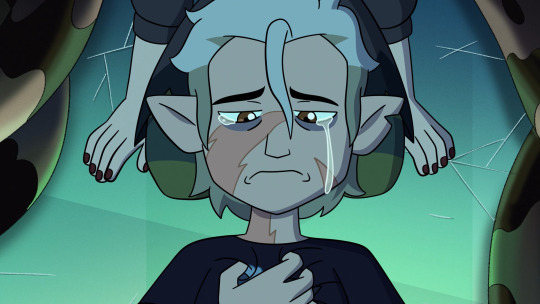
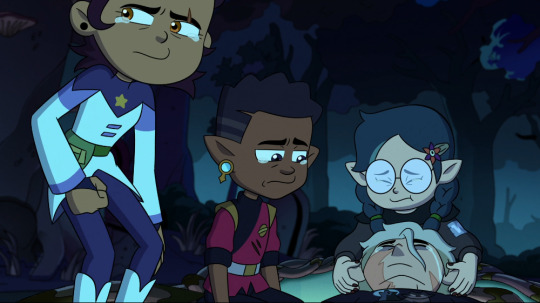
Which brings me to the above. I believe it was tremendously important that others were physically present and right next to him in the moments right after Flapjack faded away. Trusted loved ones who felt the same kind of emotions as he was, to collectively grieve as a group (hell, there hasn't even been time for them to properly mourn without rushing the process. Not yet). This would've influenced the forming of Hunter's traumatic memories related in any way to Flapjack dying.
Instances like below - him being held tightly and soothed while being in an unmatched level of pain - must have shaped the newly forming memories in a major way:

Oddly enough, this scenario in which a death has just occurred has some similarities with its opposite: birth 🤔🤔🤔🤔 The minutes and hours after any childbirth are a very sensitive window for foundations of a sense of safety, emotional regulation and even physiological processes to be built. That's why newborn infants should have pretty much constant physical touch with caregivers via e.g. skin-to-skin contact for healthy bonding to take place.
*tempted to philosophize more about birth vs death but I'm holding back from being unnecessarily lengthy*
Back to Hunter's major traumatic loss above. I'm referencing it because it's not long till we'll see him witness Belos be imprisoned, dying or however way in which he will be defeated. How could this impact on all the Belos-related memories and Flapjack-related memories he will keep recalling for the rest of his life?
I think he will require the exact same type of support once that milestone of his life - truly losing Belos - arrives. This but on a way bigger scale:
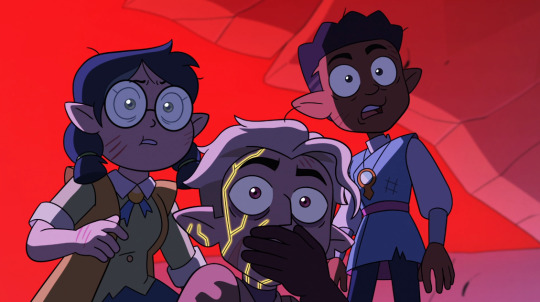
Why?
Because there's no way this part of him has totally disappeared, even now:
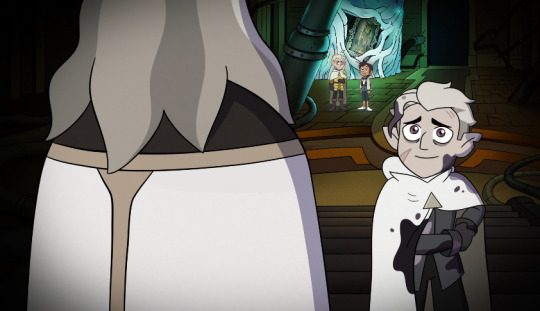
There are formative memories do to with Belos which can't be whisked away with a Delete button.
There are a number of factors influencing how he's going to absorb the seconds/minutes of that upcoming loss in Watching and Dreaming. The hours afterward will matter so much too.
Will he witness that loss with his own eyes or e.g. might Camila pull him close into an embrace and tell him not to look?
Will he have an active role in making the moment of Belos's defeat happen, or might he watch passively from a distance?
Will Belos say anything to him while it happens, or not? If yes, what are the words Hunter will hear?
What thoughts and feelings will he have about himself, and what memories will fill his mind while it happens?
Who else is there with him during and right after it happens, and what do they tell him?
All these will add up to form his experience of that loss (which is made more complicated because it is also a major gain/win for him). There is no way through this where he escapes further loss (which coexists in a messy way with gain), since trauma be like that.
Examples of other important moments in other media that portray what I'm trying to explain include this part of Avatar: The Last Airbender..

where Katara is by Zuko's side as he watches Azula, his sister, have a nervous breakdown. The physical touch from Katara matters. The memory of this event is forming in Zuko's mind and being shaped in real-time. and will continue to be shaped over time.
Another one I remembered is this moment of Silver shielding Jim in Treasure Planet (the supernova scene) when Jim's skills as a crew member (which he bet all of his self-worth on) were truly being tested:

This proved to be vital "cushioning" for what happens right afterwards: Jim, already stricken with a fragile sense of identity and no self-love, being blamed for the death of a crew member.
The last example is from How to Train Your Dragon 2. Hiccup not being on his own during his father's death and funeral:


A negative, dark example is Jinx losing Silco in Arcane:

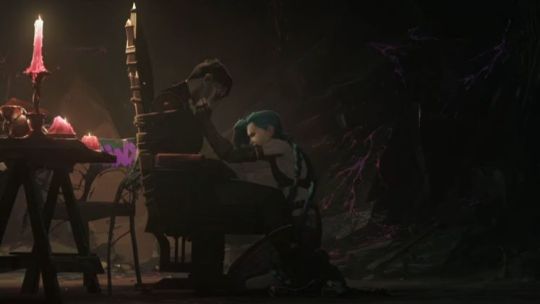
Nobody to soothe and hold her (because she rejected Vi's help due to lack of trust), and she had been the one to end his life.
Whether a parental figure we lose has been kind or cruel to us, grief is unavoidable when they are gone. Hunter's is on a exaggerated level in fiction since Belos technically murdered him via the possession and he had to be brought back to life via external means (Flapjack's sacrifice).
I was especially compelled to write this meta after a fresh realization that being physically alone and hidden in the crucial minutes and hours after a few life-altering incidents in past decades, significantly prolonged my recovery time from such awful traumatic memories.
But I'm very glad Hunter should be in excellent hands having to say that complicated goodbye (which realistically, will not be a one-time send-off) to his 'uncle', which he most definitely won't be responding to with a triumphant Hollywood kind of smile on his face.
SOMEBODY HAS TO TAKE CARE OF THIS BBY AND PUT A BLANKET OVER HIM
#toh analysis#toh hunter#toh belos#the owl house#loz writes a meta#acute grief#it's hella weird: I wrote this on my main abuser's birthday without realizing at first#death mention#trauma mention#abuse mention
163 notes
·
View notes